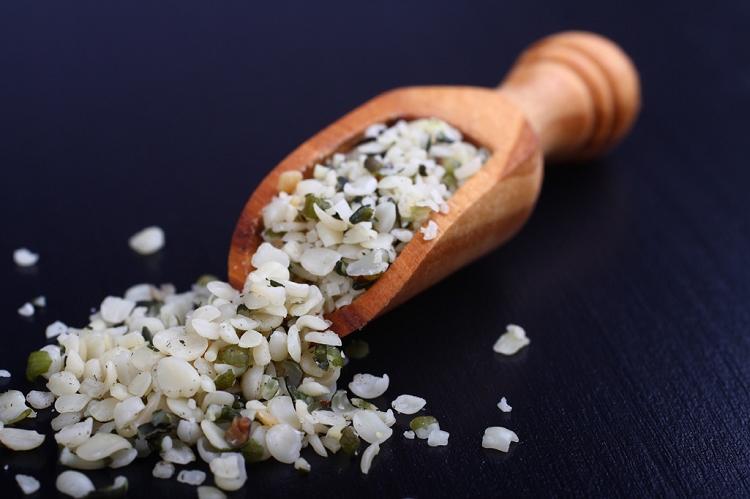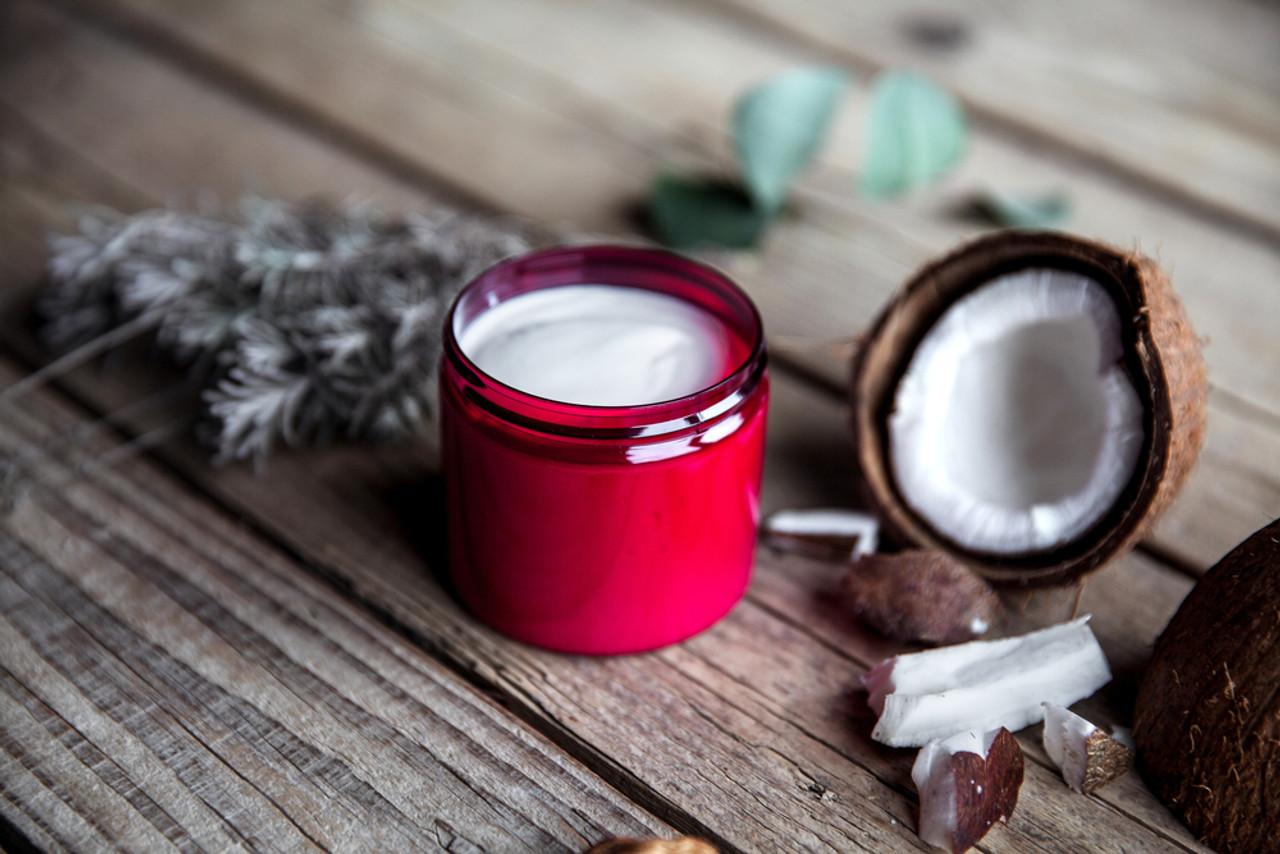While coconut oil has made a splash in the beauty and wellness world, one topic that commonly comes up when talking about the popular ingredient is coconut oil and acne. Yes, it’s light and non-greasy. Yes, it provides a cooling sensation that makes inflamed and irritated skin feel good initially. But you may be surprised to learn that coconut oil isn’t always the best choice for acne prone skin.
Have you tried this cult remedy on blemished skin and ended up with little improvement or even more acne? You are not alone. There are reasons coconut oil and acne don’t work well together.
Does Coconut Oil Help Your Skin if You Have Acne?
The saturated fats in coconut oil break down into the following maximum percentages of fatty acids:
Caprylic, C8: 9%
Decanoic, C10: 10%
Lauric, C12: 52%
Myristic, C14: 19%
Palmitic, C16: 11%
(
source)
Medium chain fatty acids have 6 to 12 Carbon atoms, putting a solid 70% of coconut oil fatty acid content into the medium chain length category. Coconut oil, along with palm kernel oil, is one of the few truly rich sources of lauric acid. You won't find this unique fatty acid in your other skincare ingredients.
Lauric acid has some nifty properties. It has been shown through in vitro studies to be antimicrobial, specifically working against the propionibacterium acnes (P. acnes) bacteria that is responsible for some acne breakouts. In fact it showed stronger antimicrobial activity than benzoyl peroxide, the standard over-the-counter acne treatment that makes a regular appearance in many teen’s skincare kit. Virgin coconut oil has also been found to help wounds heal faster in animal studies and boost antioxidant content in the skin. The major antioxidants present in virgin coconut oil have been documented to be ferulic acid and p-coumaric acid. These compounds do scavenge for free radicals, which can help prevent sun and age related damage to skin.
This sounds like good stuff for acneic skin, right? And for some, coconut oil may work like a dream in providing light moisturization while quelling the appearance of pimples. But many are experiencing the opposite effect from using coconut oil on their acne prone skin. And we may know why.

A Closer Look at Coconut Oil and Skin That is Acne Prone
Unfortunately, along with the delightful aspects of coconut oil comes the inevitable downside. Coconut oil comedogenic rating has traditionally been 4 on a scale of 0 to 5 with 5 being the highest. The term “comedogenic” means that an ingredient is likely to clog pores and cause acne comedones, or pimples. The old model of determining comedogenicity standardized in 1979 by Albert Kligman, MD, Phd involved application of the substance to the insides of rabbit ears. Newer comedogenic testing models as of this study in 1982 involving human subjects have been used as well, but at that time the rabbit's ear method had been so far found to be more sensitive than human models. (Blissoma does not support animal testing in any way, has not commissioned any animal tests, and does not use suppliers that participate in animal testing procedures. All comedogenicity testing has been done by unrelated organizations) The animal model of rating substances for clogging potential has been renounced by researchers as of 2007, stating that the methods of acnegenesis are complex and no one factor has been identified as an absolute influence. The extraction method and refining of an oil can also contribute to its unique makeup and action on the skin, with virgin coconut oil being the top choice for antioxidant content and possible non-comedogenicity on skin.
All this still does not negate the fact that many people experience acne breakouts from coconut oil. For anecdotal evidence read the comments section on the Love Vitamin's article on coconut oil. While some individuals are very happy and able to use coconut oil, many readers repeatedly report an increase in coconut oil pimples and persistent breakouts to their face and bodies with use, relenting only when they drop coconut oil from their routines.
This makes coconut oil a very dicey choice for acne skin types. The lauric acid content fights bacteria but the total oil may clog pores depending on the user. The only way to know how it will affect you is to try it, and many people whose acne is under control aren't willing to play that kind of roulette with the tender harmony they may have achieved. Some people even experience exacerbated breakouts when simply consuming coconut oil as part of their diet.
Coconut Oil and Skin’s Microbiome
Those antibacterial and antimicrobial benefits of coconut oil may be another link between coconut oil and acne. Researchers at the University of Pennsylvania found that topical application of antibacterial ingredients can disrupt the skin microbiome and alter the protective microorganisms that already exist. When this delicate balance is disrupted, it can lead to skin issues, like irritation and acne breakouts. The antibacterial components in coconut oil may actually cause an imbalance in the skin’s naturally beneficial bacteria in some users, leading to an upswing in inflammation and acne.
Coconut Oil Sensitivity and Acne
Sometimes acne may crop up due to an allergy or sensitivity. In the case of coconut oil, while coconuts are considered a fruit and not a nut, some people with tree nut allergies are still sensitive to coconut oil and may have similar reactions when using or consuming the oil. So, someone with a tree nut allergy who experiences an increase in redness and inflammation due to breakouts may be experiencing an allergic type sensitivity to coconut oil rather than clogged pores.
Coconut Alternatives for Acne Prone Skin

From clogged pores, to microbiome upset, to allergic type reaction, coconut oil causes acne to increase in many users. That doesn’t mean you have to give up on using oils if you are prone to breakouts. On the contrary, using the right facial oils can bring about a look of balance and clarity. Here are some smart picks for those battling blemishes. We recommend looking for polyunsaturated oils that contain essential fatty acids like Omegas 3 and 6, classes of compounds that coconut oil lacks and that our bodies cannot make on their own. These compounds can help calm inflammation and restore balance to your skin's ecosystem.
One
study by the American Academy of Dermatology found that people suffering from acne have low levels of linoleic acid in their skin surface lipids. One hypothesis of how this creates acne is that the low levels of linoleic acid present cause deficiency which leads to hyperkeratosis, a problem where skin cells do not exfoliate propertly and become piled up, potentially clogging pores.
In fact, essential fatty acid metabolites have been found to be lower in quantity in the skin of people suffering from a variety of skin problems, including acne. This makes a deficiency of essential fatty acids something you want to tackle if you want clear skin, and coconut oil will not help you with that.
Essential fatty acids literally help build cell membranes, which is important if you want healthy cells. A healthy cell membrane is fluid and flexible. Topical application of oils with essential fatty acids can help the surface of the skin maintain the right moisture levels as well, which can prevent stress to the skin and moderate sebum production.
We recommend that you consider using coconut oil only as a small part of your skincare routine if you have acne issues. When blended with other oils the downsides of coconut oil are minimized and its benefits are maximized because your skin is benefiting from a wider range of nutrients.
Grape seed oil is an awesome source of the linoleic acid (Omega 6) compounds your skin may be missing. Grape seed oil contains approximately 66% - 75% linoleic acid! The oil can also contain antioxidant phenolic compounds that can keep your skin looking youthful as you work on eradicating your acne. Make sure you are using a raw oil that has not been solvent extracted to get its benefits. Raw grape seed oil should be deep green in color. Refining damages both the essential fatty acids and the antioxidant content. Many clear grape seed oils sold at health food stores are too stripped of nutrients to help your skin.
Watermelon seed oil is also known as Kalahari melon seed oil, and it's an oil not as many people know about. It is especially good for acne skin types as it is extremely light and absorbent into the skin, and has the ability to mix with thickened sebum in pores to help it release. This prevents clogging and breakouts. It contains 55% - 65% Omega 6 (Linoleic Acid). Use this lovely oil for facial massage to help keep pores clear.
Hemp seed oil is also perfect for blemish prone skin as it works to reduce the look of inflammation and has a comedogenic rating of 0, so will not clog pores. Hemp reduces the appearance of redness and lends a comforting feel to skin. Hemp seed oil is a fabulous source of both Omega 6 and Omega 3 fatty acids, which both benefit skin with acne. The Linoleic (Omega 6) fatty acid content is generally around 55% and the Alpha-linoleic (Omega 3) fatty acid content is around 17.3%.
Cranberry seed oil can help by providing a diverse range of Vitamin E compounds like tocopherols and tocotrienols. Vitamin E compounds help renew other antioxidants so you get more bang out of them, plus providing their own antioxidant activity. The phytosterol content of this oil provides anti-inflammatory benefits, and cell protective properties. This oil is super absorbent so it won't leave skin feeling oily and won't clog pores. It also contains antioxidants and carotenoids to help prevent daily skin damage and provides Omegas 3, 6, and 9 in a nearly 1:1:1 ratio. Linoleic (Omega 6) fatty acids are about 35% - 45% of this oil, Alpha-linolenic (Omega 3) fatty acids are about 22% - 35%, and Oleic (Omega 9) fatty acids are about 20% -25%.
Tamanu oil is well suited to those with acne skin issues due to its antimicrobial, anti-inflammatory, and skin rebuilding properties. The xanthone compounds in tamanu make skin feel calm and comfortable, reducing the appearance of swelling and irritation. While this oil does contain antibacterial properties, tamanu improves the appearance of acne while lending a super gentle and balancing feel to skin. This oil is higher in Omega 9 fatty acids at approximately 40%, and has Linoleic acid at approximately 29%.
Jojoba is another natural oil that works well on all skin types, including acne prone skin. What makes this ingredient so universally pleasing? Jojoba is the oil most closely matched to the skin’s naturally produced sebum. This "oil" is actually a liquid wax, so it is quite different from many other oils. As such it contains only trace amounts of Omega fatty acids, but that does not stop it from being a great match for acne prone skin. It’s skin conditioning without feeling greasy and doesn’t clog pores. Win, win, win!
While causes behind acne breakouts can be difficult to pinpoint, considering coconut oil as a culprit may be a good idea if you’ve ruled out common triggers. Do you tend to see more clogged pores, redness, inflammation, or sensitivity after you’ve used coconut oil? This often doesn’t happen right away and signs may appear a few days or weeks after you being using the oil. If you think coconut oil may be causing an increase in your acne, try discontinuing use and replacing the oil with another from our list above. There are too many wonderful natural oils that work well on acne prone skin to suffer through painful breakouts.
Here’s to clear, calm, happy skin!
Disclaimer: The information contained on this site is general in nature and for informational purposes. It is not meant to substitute for the advice provided by your own physician or other medical professional. None of the statements on this site are a recommendation as to how to treat any particular disease or health-related condition. If you suspect you have a disease or health-related condition of any kind, you should contact your health care professional immediately. Please read all product packaging carefully and consult with a healthcare professional before starting any diet, exercise, supplementation or medication program. Cosmetic products have not been evaluated by the Food and Drug Administration and are not intended to diagnose, treat, cure, or prevent disease.


